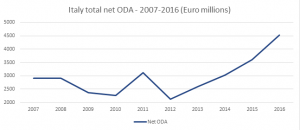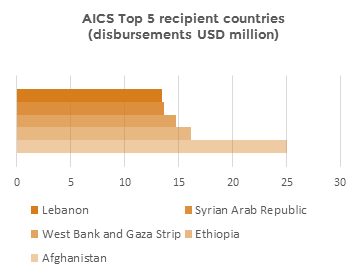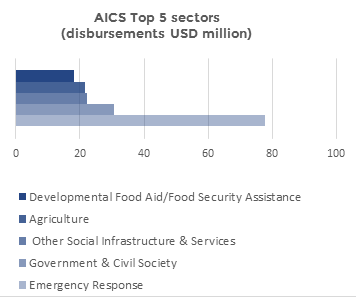Italian elections – Choosing the next leader for ‘the open aid of the future’?
This blog includes input from Research Assistant Ines Schultes. Thanks to Luca De Fraia, Deputy Secretary General of ActionAid Italy for comments on an earlier draft.
On 4th March, Italian voters will be going to the polls for their general elections. Following an increase in the budget, international development cooperation appears to be back on the national agenda.
So what has the Italian government done so far on aid and development and how does it fare on transparency?
Italy has historically been an important player in international development. As an EU member state, Italy is one of the largest European donors. It is also a signatory to international treaties on aid effectiveness and transparency. But its words have not always been matched by action.
Publish What You Fund has been monitoring Italy’s commitment to transparency since 2012, through the Aid Transparency Index. Italy was the only European nation included in the 2016 Index who did not honour its commitment to aid transparency and did not provide current information on its projects across the world. The need for greater transparency was also outlined in the 2017 Commitment to Development Index. This report also highlighted that Italy is still below the 0.7% GNI target for development aid.
It seems that recently aid and development finance has reappeared at the forefront of the national agenda. This is mirrored by a gradual increase to its total budget, partly accounted for by a significant increase in refugee spending domestically.

A new agency dedicated to international development and a growing budget
In 2014, the Italian government modified the law regulating how international development and cooperation was managed and administered. This materialised in 2016 when Italy changed its institutional settings and created a new development agency, the Italian Agency for Cooperation and Development (AICS). Its official objective is to “align Italy with its principal European and global partners in the endeavour of development.” It also wants to strengthen coordination as recommended by the OECD and EU development policies. The agency spent a total of €292m in 2016 and its annual budget is expected to rise to €532m by the end of 2018.


Renewed international commitments to increased transparency
Three initiatives in particular give us cause to hope that Italy is renewing its commitments to transparency and taking serious steps to implement them:
- Italy joined the Open Government Partnership in 2011 and is now implementing its third National Action Plan (2016-2018) which includes a commitment on open aid data through the creation of a new online platform. While implementation of the first two plans has been delayed, the involvement of civil society organisations in the design and monitoring of the third plan was generally welcome.
- A year ago, in March 2017, AICS strengthened its commitment to aid transparency by becoming a member of the International Aid Transparency Initiative (IATI). “Adhering to this standard was an extremely important decision for AICS, but doing so was challenging indeed, since the adoption of such a high quality technical standard required a major updating of our Agency’s computer and management systems. We had to rethink and reinforce our entire internal management system (from SIC to SICONTA) and redefine our personal classification fields for inserting data in the light of the latest OECD-DAC indications and new sustainable development goals”, explained Emilio Ciarlo, Manager of Institutional Relations and Communication at AICS. AICS started publishing information on its activities in Ethiopia last year – the first time that Italy has published any development information in a comparable open data format. Data on other countries has recently been added and more is expected in the next few weeks and months, especially on AICS’ priority countries and current activities.
- Activists also generally welcomed the approval in 2016 of a Freedom of Information Act, formally granting every citizen the right to access documents held by public bodies. As part of the OGP plan, civil society organisations that fed into the first drafts of the document are also invited to make further suggestions on improvements and participate in monitoring.
Implementing the open aid of the future with citizens
Taken at face value, all these institutional changes signal positive steps taken by the Italian government to play a more important role in the development sector. More importantly, they represent a significant change from past transparency performances to set a path to what the AICS calls the ‘open aid of the future’.
In addition to the publication of open data, directly engaging with citizens is an important element of transparency to drive change and foster accountability. AICS redesigned its open aid portal, which includes data on past and current projects, to facilitate communication on its activities with the Italian public. It also organised the first national conference on development cooperation in January 2018. This represents a first step towards listening and responding to citizens’ questions and concerns.
A significant second step would now be to directly engage with citizens and civil society organisations in partner countries. Ensuring there is space for feedback from the people and communities who directly benefit from Italy’s aid and development programmes is a true sign of a responsible aid publisher. This would also ensure that aid and development finance budgets are not used as instruments to address in-donor country security concerns but rather primarily spent abroad to tackle poverty and meet the needs of partner country communities.
Publish What You Fund will be monitoring Italy’s aid transparency efforts again this year with the publication of the 2018 Aid Transparency Index in June. We will also keep up dialogue with AICS on how to promote the available data in partner countries. This is so that it can be used to support decision-making processes and to give the means to others to hold the government and donors accountable to citizens. In the meantime, over to Italian citizens to choose their preferred leader to drive the open aid of the future!


This is a critical election that has many important implications. Determining where to put money is a heavy task that, hopefully, is done correctly and put towards solving social problems such as poverty and not going straight to private donors’ issues. Many problems arise from money in startups so it is important to have enough business capital at the initial stages and to make sure that money goes where it is supposed to. I hope this election works out for the people of Italy for the better.